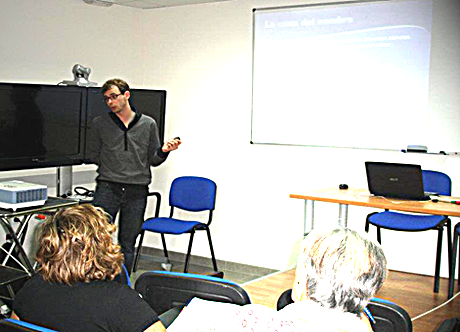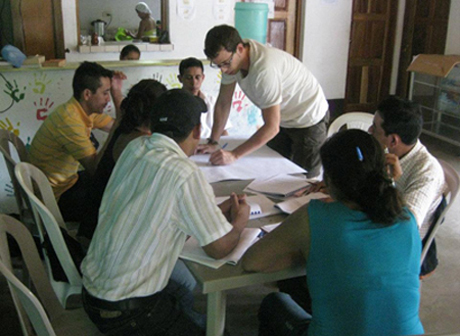Economics
It's a battle of the ideas. Watch. Read. Be critical. Argue. Figure things out.
Teaching
It's more important to teach how to think than what to think.
Cooperació internacional
Des de la solidaritat, l'estima i el respecte entre els pobles i les persones.
Technology teaches
Tech tools that help us teach... and learn.
Londres no és Itaca
Però ha d'estar en el camí.
dilluns, 31 de desembre del 2012
Teaching pills 2 - Fractions: Learning by playing
divendres, 28 de desembre del 2012
Teaching pills 1: Primary Maths. The easy way to multiply
 I guess most of you have got it straight away, but I'm going to explain it with a bit more of detail just in case anyone studied laws -sorry, solicitor and lawyer friends, I know the truth can be painful. First, the mnemonic rules: You all know multiplying by five is easy, just the half ten (v.gr. 8x5 = [the half ten of 8] 40). Most of you might also know that multiplying by nine is very easy indeed, just the previous ten and what's missing to get to nine. It is to say: if you want to multiply, for instance, 6x9, you take the previous ten of six (5, fifty-something), and the unit is what's missing to make nine: 4. So, 6x9= 54. This works. Ok, we've got every single number multiplied by 5 or 9. Then, adding up to four times can be done mentally without effort. So, we have deduced every single digit multiplied by 1 to 5 and by 9. Now we have these two ops, 6x6=36 and 7x8=56, which we'd better memorize (we could eventually add them but I have realized it's a bit tricky for children) and now we have a supporting point to get to every single-digit multiplication directly or by just adding or substracting the number once. Think about any single-digit multiplication, let's say 6x7? the child mental process would go: Ok, I know 6x6=36, so if I add 6 I'll have 6x7! 36+6=42. Good. 8x3? Ok, eight and eight, sixteen, and eight twenty-four. Easy. 8x6? Humpf, well I know 8x7=56, so if I substract 8 I'll have 8x6 -> 56-8=48. Or either I know 6x6=36 I add six twice and I'll have 8x6 -> 36+6=42 +6= 48. And so on, and so forth.
I guess most of you have got it straight away, but I'm going to explain it with a bit more of detail just in case anyone studied laws -sorry, solicitor and lawyer friends, I know the truth can be painful. First, the mnemonic rules: You all know multiplying by five is easy, just the half ten (v.gr. 8x5 = [the half ten of 8] 40). Most of you might also know that multiplying by nine is very easy indeed, just the previous ten and what's missing to get to nine. It is to say: if you want to multiply, for instance, 6x9, you take the previous ten of six (5, fifty-something), and the unit is what's missing to make nine: 4. So, 6x9= 54. This works. Ok, we've got every single number multiplied by 5 or 9. Then, adding up to four times can be done mentally without effort. So, we have deduced every single digit multiplied by 1 to 5 and by 9. Now we have these two ops, 6x6=36 and 7x8=56, which we'd better memorize (we could eventually add them but I have realized it's a bit tricky for children) and now we have a supporting point to get to every single-digit multiplication directly or by just adding or substracting the number once. Think about any single-digit multiplication, let's say 6x7? the child mental process would go: Ok, I know 6x6=36, so if I add 6 I'll have 6x7! 36+6=42. Good. 8x3? Ok, eight and eight, sixteen, and eight twenty-four. Easy. 8x6? Humpf, well I know 8x7=56, so if I substract 8 I'll have 8x6 -> 56-8=48. Or either I know 6x6=36 I add six twice and I'll have 8x6 -> 36+6=42 +6= 48. And so on, and so forth.divendres, 16 de novembre del 2012
Good (and bad) practice among advertisement in Charities / International Development

I think that the charity advertisement should be conceived to change attitudes more than raising money, or at least change them while raising money. They must be carefully designed to present the utmost respect to the objective population and to the audience at the same time. They should move to actual actions, for small they were, which help change things for good. In this respect there are indeed many actions we can perform from here to change things, such as ethical shopping, political lobbyism, voluntary involvement or reducing our consumption (of goods, energy). We should be showing far more of what we can do and a lot less of what we can't avoid to happen, since this is counterproductive. And, last but not least, they should avoid creating a perverted picture of the truth. To illustrate what I mean and to finish with a thoughtful smile, another awesome brand new campaign, now on video: Africa for Norway, RADI_AID!!!
divendres, 2 de novembre del 2012
Incongruència fiscal
 |
| Els estudiants de la U. de Suffolk fan uns dibuixets xulos |
A Grècia un periodista va publicar les dades de 2000 evasors fiscals i la policia no va tardar en reaccionar i detindre... al periodista.
És impossible mantenir un sistema fiscal en franca competència a la baixa i alhora un estat del benestar mínimament funcional. Pareix obvi, però hi ha gent com Miguel Sebastián, autoanomenat socialista, que estan tan obcecats en demostrar que la funció redistributiva de l'Estat es fa per la via de la despesa i no de la recaptació (ojo, que en això tenen raó) que es despisten de que per la via de la recaptació es fa també molta redistribució... però al revès. És a dir, la recaptació fiscal arreu del món (també autoanomenat) desenvolupat és generalment regressiva, com demostren centenars d'estudis, i per tant redistribueix sí, però de les classes baixes i mitjanes cap a les classes altes. I encara hi ha qui, com Sebastian, defensen un tipus únic de l'IRPF -diguem un 25% o un 30%, tant fa- sigues ric como Amancio o pobre com jo. Això necessàriament faria el sistema més regressiu, encara que s'empenyen en que llevant deduccions i apujant el mínim exempt no seria tan greu. I per què defensen este canvi? Diuen que per facilitar l'enteniment i pagament de l'impost i evitar incentius perversos. [Un exemple: Fa uns anys estava de moda el problema de l'escala. Com l'IRPF es paga per trams -de tant a tant un 25%, de tant a tant un 30%...- hi havia un incentiu pervers en les fronteres d'un tram a l'altre per amagar certs ingressos i no passar de divisió. Això, no obstant, és més vell que les màquines d'escriure i els vídeos Beta i hui en dia l'estructura de l'impost directe podria i deuria ser contínua i creixent -és a dir tant guanyes, tant et toca i si guanyes mil més, un 0,1% més, o un 0,01% o el que corresponga, segons la pendent de la funció que s'haja decidit. Aquesta pendent seria el que s'hauria de debatre entre polítics i tècnics i el que la ciutadania hauria de poder votar. Per l'amor del nostre senyor, si les iaies tenen facebook i la declaració de la renda no la fa ningú, la fa un programeta d'ordinador via esborrany -la majoria- o programa PADRE.]
És veritat que és possible que un tipus únic no fora catastròfic, si va acompanyat de llevar les deduccions per vivenda i fons de pensions, però és evident que agreujaria la regressivitat del sistema. I a canvi de què? Els defensors del canvi tenen fe en que d'aquesta manera els evasors evadirien menys, supose que basant-se en que ara evadeixen perquè fan una mena de desobediència civil a la progressivitat. Jo sóc menys psicològicament profund en les meues anàlisis: Crec que evadeixen perquè poden. Perquè no se'ls persegueix ni castiga, i, encara més, perquè se'ls faciliten instruments per evadir. Eixe és EL problema fiscal.
 |
| Isak Andin, amo de Mango, explicant quant pensa pagar d'impostos enguany |
** els que em coneixeu de temps sabeu que sóc un tipo molt humil. El més humil del món diria jo!
dissabte, 15 de setembre del 2012
Seven-up
 |
| Esto vendo. La double-choc es una verdadera jartá de chocolate. |
 |
| Lo recomiendo fervorosamente |
 |
| Perdonad la calidad pero mi móvil de noche es una mierda. Solo hubiera sido mejor atada directamente al cartel :) |
dilluns, 20 d’agost del 2012
Kill all the bacteria!
Como tengo menos tiempo (y fuerzas) para escribir os dibujo una escena corta, casi una foto (quiero puntualizar que el hecho de que intuya que se agradezca por parte del sufrido lector no tiene nada que ver: ni una concesión al márqueting, faltaría más, yo soy un artista):
 |
| Sí, sí, cinco estrellas, sí. |
 |
| el post visto por @SaraMarcos4. Eres grande, chica. |
 |
| Vale, vistas así dan asquete, pero, ¿estamos todos locos? |
dimarts, 14 d’agost del 2012
about charities
 Of course they do. Even though charities are sometimes called
Not-For-Profit, I believe that this name can be misleading. The
third sector organisations make a social profit, it is to
say, they make a profit not for their owners, as a private company
would do, but for the whole society. And we don't need to be talking
about economic profit only. Actually, I don't like the name
charities either, because it seems to me that it takes to a
picture of unequal and hierarchic relationships going from who has
to who has not (money, capabilities, knowledge) based in a sort
of somehow hypocritical generosity, a picture which I believe is
completely wrong. I'd prefer to talk about cooperation, social
organisations, third sector or non-governmental organisations. Words
are important, they say and they do, as we might put it, and
I try to use them in a conscious way.
Of course they do. Even though charities are sometimes called
Not-For-Profit, I believe that this name can be misleading. The
third sector organisations make a social profit, it is to
say, they make a profit not for their owners, as a private company
would do, but for the whole society. And we don't need to be talking
about economic profit only. Actually, I don't like the name
charities either, because it seems to me that it takes to a
picture of unequal and hierarchic relationships going from who has
to who has not (money, capabilities, knowledge) based in a sort
of somehow hypocritical generosity, a picture which I believe is
completely wrong. I'd prefer to talk about cooperation, social
organisations, third sector or non-governmental organisations. Words
are important, they say and they do, as we might put it, and
I try to use them in a conscious way.Stage 3:
They asked a few more stuff related to charities management, community management in Charities and ICT. Firstly, they asked me to write some tweets, promoting now different campaigns of a charity. I am rewriting them again, to make it more realistic:
#QSA's Homestore empowers low income citizens by providing good quality, affordable furniture which helps them to build up their self-worth
— KepaGdeLatorre (@KepaGdeLatorre) 9 de febrer de 2013
the QSA's Knees Up Programme in 2010/11 helped to create bonds and a sense of community and trust between neighbours previously isolated
— KepaGdeLatorre (@KepaGdeLatorre) 9 de febrer de 2013
In 1998 #QSA gathered 130 years of Quaker fight against poverty andtough living condition in East London. #impactquakersocialaction.com/history
— KepaGdeLatorre (@KepaGdeLatorre) 9 de febrer de 2013
and I gave them back this:
dijous, 5 de juliol del 2012
A Waiter's Friend
 |
| Recomanació del Major als ciclistes. A València seria Pay Back. Res a vore amb el post però m'ha fet gràcia l'anunci |
dimarts, 12 de juny del 2012
Okupa Portobello
 |
| Sugerente logo de una de las empresas de colocación. Esta nos trató bastante bien |


































